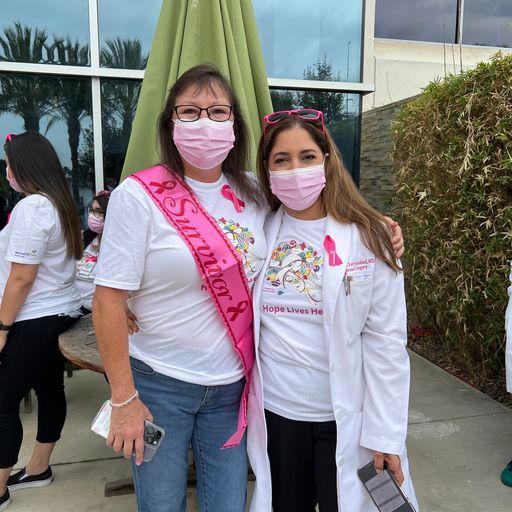 About one in eight women will develop breast cancer during their lifetime. Thankfully with technological advances like screening mammography, breast cancer can be caught at its earliest, most treatable stage.
About one in eight women will develop breast cancer during their lifetime. Thankfully with technological advances like screening mammography, breast cancer can be caught at its earliest, most treatable stage.
Kristy Masterson knows first-hand about the importance of early detection, especially if one is at high-risk for cancer.
Kristy was scheduled for her annual mammogram at MemorialCare Breast Center at Long Beach Medical Center. During her appointment, she was advised to have a breast MRI screening done because she was high-risk for cancer. Unlike a whole-body MRI, breast MRI is designed specifically for breast imaging. This technology provides detailed images of breast tissue using a magnetic field and radio waves instead of the x-rays used in mammography. This advanced imaging technology helped the care team to accurately diagnose her with Stage II breast cancer.
“Although I was high-risk for cancer – given my family’s history – I was still not prepared to hear, ‘You have cancer,’” Kristy said. “But the team at MemorialCare Breast Center took such great care of me.
Dr. [Maria] Dungo and Dr. [Jessica] Rayhanabad were the best and walked me and my husband through what the process would entail.”
After Kristy and her husband met with Drs. Dungo and Rayhanabad, Kristy began her chemotherapy treatments. Kristy and Drs. Dungo and Rayhanabad had created a personalized care plan specific to Kristy’s unique case. It was determined the best course of treatment was to start with chemotherapy to help shrink the tumor and then schedule surgery to remove the tumor.
Kristy underwent 11 chemotherapy sessions.
“All things considered, I was extremely blessed during my treatments,” said Kristy. “I was lucky that I wasn’t nauseas during my treatments, but it definitely wasn’t easy. I think what helped me during the treatments was that I continued working, even on the same day as my chemotherapy sessions. I highly advise anyone who is going through cancer treatment, to try and keep your usual routine as much as possible because it helps take your mind off things – to an extent.”
As Kristy was about to wrap-up her chemotherapy sessions and prepare for surgery, she also received genetic testing at MemorialCare Todd Cancer Institute to see if she was at risk for breast cancer recurrence.
Kristy’s genetic testing looked to identify if she had a “broken” BRCA gene, an abbreviation for BReast CAncer gene. The BRCA gene usually helps prevent breast cancer, but according to the National Breast Cancer Foundation, when the BRCA gene is “broken” it may no longer be able to help prevent breast cancer
When Kristy learned that she did test positive for the broken BRCA gene, she made the decision to have a double-mastectomy – when both breasts are removed – and a hysterectomy, a surgical procedure to remove the uterus. Kristy did not want to run the risk of her cancer returning.
After her surgery, Kristy also tested to see if the cancer had traveled into her lymph nodes. Luckily the tests came back negative, which gave Kristy a huge sigh of relief.
“Five years later, I’m here to watch my daughters grow up. I have more time with my family and friends, and I owe it all to the MemorialCare Breast Center team,” said Kristy. “Because of the dedication to detail and ensuring that me and my family were ok not just physically, but mentally and emotionally as well, I was inspired to give back. So now I’m a mentor for the Women Guiding Women: Cancer Support & Education program at the Breast Center, where I help encourage and guide other women through their cancer journey.”
Although Kristy has completed her chemotherapy treatment and surgeries, she is still under maintenance treatment to ensure the cancer does not return and will continue her maintenance treatment for 10 years.
“No one ever wants to hear that they have cancer or that they might have a gene mutation that might lead to cancer, but it’s important to get tested and get screened,” said Dr. Rayhanabad. “And Kristy is a great example of the importance of getting screened and knowing your risks for cancer. Not only were we able to capture her cancer early, but we were able to treat it effectively. So be sure to schedule your mammogram and genetic test screening to understand your risk of cancer.”